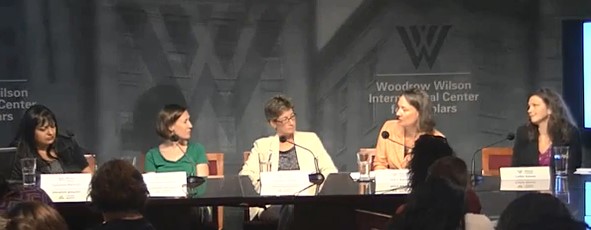Married Adolescents and Reproductive Health: Meeting the Unmet Needs of a Vulnerable Population
By Kathryn Krueger on August 15, 2014

Addressing reproductive health and HIV in adolescents can be incredibly challenging, especially for married and ever-married girls,due to their heightened vulnerability, unmet needs, and increased isolation from family, the community, and health services. Adolescent girls between the ages of 15-19 experience a higher rate of unmet need for family planning than married women. An estimated 10 million girls around the world are married before the age of 18, with 1 in 7 girls married in developing countries before their 15th birthday – some child brides are married as young as 8 or 9 years old. Particularly in low-resource settings, a girl’s age and marital status can play a key role in determining her ability to negotiate sexual initiation, contraception use, family size and child spacing, access to sexual and reproductive health services, and make independent and informed health decisions for herself and her children. These issues are further exacerbated by the increased likelihood of married girls losing access to education, becoming isolated from family and friends, and experiencing gender-based violence (GBV).
Experts and leaders in the field, representing USAID’s Office of HIV/AIDS, the International Center for Research on Women, CARE, and Pathfinder International, gathered in Washington, DC at the Woodrow Wilson Center on July 30th, 2014, to share and discuss current work being done to address this critical issue through the Wilson Center’s Underage: Addressing Reproductive Health and HIV in Married Adolescentsconference. Access to health services, harmful social and cultural factors, and the lack of engagement among men and boys emerged as core themes identified by all four expert presenters at the Underage conference, including Doris Bartel (CARE USA), Elizabeth Berard (USAID), Suzanne Petroni (ICRW), and Callie Simon (Pathfinder International).
Through ICRW’s Improving Adolescent Sexual and reproductive Health in Bangladesh project, a widespread survey of 320 married girls, aged 15-19, was conducted within a diverse range of slums and offers an eye opening glimpse into the challenges induced by child marriage. Societal norms inhibit girls from talking openly about sex or seeking sexual health services and as a result, girls expressed a severe lack of understanding regarding reproductive health and even normal puberty and fertility cycles.
CARE’s Towards Improved Economic and Sexual/Reproductive Health Outcomes for Adolescent Girls (TESFA)studyin Ethiopia, focused, in part, on increasing married and ever-married girls’ understanding of sexual and reproductive health, while introducing a societal norms change component in which married girls’ male partners were engaged in training and dialogue around healthy marital dynamics and the importance of sexual and reproductive health. Work engaging partners helped decrease GBV and increase couples’ use of contraception.
Pathfinder International’s ongoing Addressing the Needs of Young Married Women in the West Africa Regionproject highlights the critical challenges that married girls’ face: extreme lack of mobility affecting access to health services, cross-generational marriages, pressure to have children quickly in fear of divorce or abandonment, and subservience to mothers-in-law and elder co-wives. The project is currently conducting home health visits to reach isolated married girls and peer mentor trainings on life skills, puberty, contraception, and healthy timing and spacing of pregnancies.
Addressing the needs of married adolescents is incredibly important and this vulnerable population, particularly married girls, must be uniquely targeted due to the range of daily challenges they face that inhibit them from accessing and utilizing the health services and education they need and deserve. We at WI-HER LLC recognize that many factors at multiple levels of society affect the gender-related challenges faced by married adolescents and must be addressed in concert to generate successful health outcomes and shifts in thinking. We address gender roles and relations at multiple levels and consider the varied contextual factors that drive outcomes for men and women, boys and girls. WI-HER is a partner on the USAID Applying Science to Strengthen and Improve Systems (ASSIST) Project and takes an improvement approach to integrate gender bycollecting and analyzing sex-disaggregated data and systematically identifying and analyzing gaps in outcomes among men and women, boys and girls. WI-HER, through the ASSIST Project, is working to integrate gender into projects focusing on the challenges and needs of orphans and vulnerable children, identifying girls’ increased vulnerability to early marriage and reproductive health-related issues. WI-HER will continue to advocate for the rights of married and ever-married adolescents through the ASSIST Project and other projects around the world.